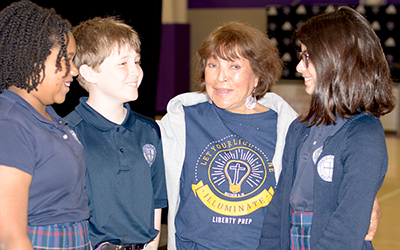Holocaust survivor, 93, shares with ESK students

Through the collaboration with Tennessee Holocaust Commission, Anya Baum, 93, provided her account of living in Stalingrad, Russia, during World War II, from 1941 to 1945.
Her mother returned to Russia (from Germany) only for Germans to kill her, along with Baum’s father, brother and grandfather.
“That was the end of my family,” she said. “They killed 8,000 Jews (in their village).”
Born in Russia, Baum was 10 years old when the Holocaust began for her.
“We were poor, but it was OK. We had family and friends,” she recalled of the days before Nazi troops invaded her village. Because they were in Russia, she recalled they could not practice the Jewish faith, so she did not even know she was Jewish.
Fleeing German troops
Her family then got word from her aunt that German troops were coming.
“Father was in the (Russian) army already,” Baum recalled. “He had gotten injured by shrapnel in his head.”
She recalled joining her mother, brother and an aunt as they ran to the highway when they saw (Russian) military trucks coming toward them. Her aunt had a little red book that showed she was “important.”
“They had to stop,” Baum said of the troops. After some reluctance on the soldiers’ part, the family was given a ride to a shelter before they were boarded in a cattle train.
“Everybody was running to the cattle train,” she said. In that train, “there was no water, no food … we were so hungry … my brother stroked out.
“Someone gave him a piece of bread,” Baum added.
When the train stopped, everyone got out and walked to the next village to temporary safety.
Many hardships
“For four days we got just a handful of water,” she said.
Once at the village, they went to a cafeteria where they each received a bowl of soup and a piece of bread.
However, Baum’s mother became ill. She urged her brother to run for a doctor.
Meanwhile, Baum prayed.
“A miracle happened,” she recalled. When the girl returned to her mother, the mother was upright and fine.”
Baum then became ill. First, her hair was infested with lice.
“My mother washed my hair with gasoline,” she said. “It burned, but the lice were killed.”
Baum was then struck with typhus and spent 40 days in the hospital.
A letter was written to her uncle, who sent her some clothing and a hat. She recovered from the fever.
During that time, Baum’s mother worked in the hospital, where soldiers were being brought in.
“Mother took the shoes and coats from the dead soldiers and made clothes,” she recalled.
Her mother subsequently returned to Russia where her family members were killed
She recalled her father had a dog that followed him. When the father was shot and thrown into a hole dug as a mass grave, the dog jumped in after its master.
After the horrors
Baum continued to live in Europe, having traveled from Russia to Poland and Canada, where she lived for 16 years until 1967, when she came to the United States.
“I worked all my life,” she said. Sometimes that work meant cleaning homes — until she became a makeup artist for a princess of India.
Advice to ESK students
Still she observes, “You kids are very lucky. You live in a beautiful country. You have parents who love you.”
Baum urged the students to give their parents a hug.“A hug a day takes the problems away,” she said.”
Baum also urged students to stay in school — and don’t hate. “I don’t hate,” she said. “I love everybody.”


